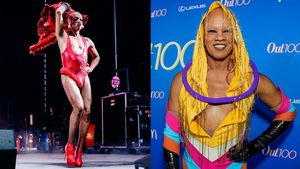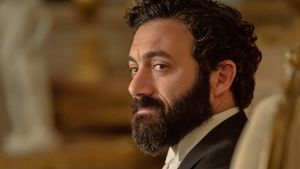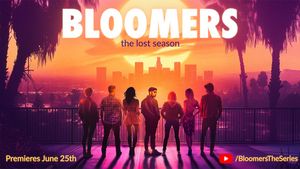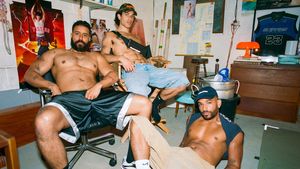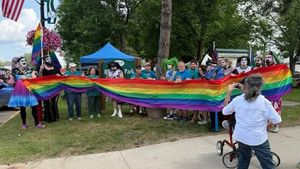Left: Wojtowicz's mugshot after his failed bank robbery attempt
There is something alluring about John Wojtowicz, the real-life man who inspired Al Pacino's legendary character in Dog Day Afternoon. He's a colorful braggart, an early and abrasive LGBT rights activist, a mama's boy (in his words), a bank robber, a sexual liberationist, and a lover of both men and women. More than anything, Wojtowicz, whose real story is immortalized in the brilliant new documentary The Dog, is an incurably romantic criminal, and the "who" and "what" components of his story aren't nearly as interesting as the "why" of it all.
Filmed over the course of 10 years by codirectors Allison Berg and Frank Keraudren, The Dog (which hits theaters today and iTunes August 15) interweaves extraordinary archival footage of the robbery, 1970s-era interviews, early film of what was then simply the gay liberation movement, recollections from gay activists who know Wojtowicz, and a decade of interviews with the man himself.
 Right: Wojtowicz with his mother, Terry Wojtowicz
Right: Wojtowicz with his mother, Terry Wojtowicz
Wojtowicz was an unlikely gay rights pioneer in New York City, at a time when he says gay couples couldn't publicly hold hands, even in the famously queer Greenwich Village. Once, when he did hold hands with another man, a police officer called Wojtowicz a "f****t."
His response? He grabbed the man and "tongued him" right there on the street.
But that would be a life-long M.O. for a man who as an early LGBT advocate would embarrass even other activists with his coarseness, vulgarity, self-aggrandizing, and yes, his unabashed sexuality. He loved sex. He had his first gay sexual experience while serving in the Vietnam War. He left his first wife to immerse himself in gay culture, got involved with the Gay Activists Alliance shortly after the Stonewall riots, and though mostly in the background, in 1971 helped organize one of the earliest same-sex marriage protests, when seasoned gay activists and groups like GAA didn't want to touch the issue.
But Wojtowicz, who was nicknamed Littlejohn (he says it's because he has a "little prick"), believed in love and marriage.
"When I love somebody, I want to marry them," he says in the film. A message that resonates with marriage equality activists today, but one that was unusual in 1971.
 Left: John Wojtowicz weds Liz Eden
Left: John Wojtowicz weds Liz Eden
He fell in love with a transgender woman, back when the word "transgender" wasn't commonly employed and pronouns usage was rarely what we'd call politically correct today. He wanted desperately to marry Liz Eden, and so the two had a wedding ceremony -- she donned head-to-toe white, and her veil towered nearly a foot above Wojtowicz. Footage of the wedding shows up in The Dog and helps remind us what a romantic this guy is, without reservations about gender.
He was openly bisexual without using that word. Though he's hardly a great role model, with cheating on his lovers and his bank-robbing ways, when he loved, he loved.
Eden had been living as a woman but desperately wanted gender-reassignment surgery. Wojtowicz fought it at first -- when the two met, Eden was still going by Ernie and performing in drag -- but when Eden became suicidal he changed his mind and supported her medical transition in a big way. A very big way. In August 1972, he attempted to rob a Chase Manhattan bank in Brooklyn to finance his new wife's surgery. That effort resulted in a 14-hour hostage situation that was broadcast live on TV and eventually left his partner in crime, Sal Naturale, dead, shot by police during their bungled escape.
 Right: Wojtowicz poses with guns and dollar bills
Right: Wojtowicz poses with guns and dollar bills
Wojtowicz went to prison. Three years later, Eden sold the story to Sidney Lumet, who made the critically acclaimed film Dog Day Afternoon, in which Al Pacino plays Wojtowicz. The film had a huge impact on Wojtowicz. Fellow prisoners called him "The Dog," in part because they couldn't pronounce his last name (it's WAHT-a-witz). The Dog embraced that persona and left prison as that man.
But not before falling in love again, with Georgie Heath, a gay man he met at Lewisburg Pennitentiary. Heath performed drag but identified as a man. Still, Wojtowicz calls Heath his "third wife."
There's plenty more to The Dog than can be summed up in a review: a mother who is as close to her son as can be; a developmentally challenged brother who is beloved; The Dog himself, now dying of breast cancer and skin cancer, getting thinner and thinner in every shot but never losing that wonderful libidinous spirit; footage of Eden, who died young of AIDS.
It's a rose-colored trip down memory lane of a larger-than-life guy who, even in celluloid, continues to seduce just about anyone who sits down to watch The Dog.
See the trailer:
All images courtesy of Drafthouse Films


 Right: Wojtowicz with his mother, Terry Wojtowicz
Right: Wojtowicz with his mother, Terry Wojtowicz Left: John Wojtowicz weds Liz Eden
Left: John Wojtowicz weds Liz Eden Right: Wojtowicz poses with guns and dollar bills
Right: Wojtowicz poses with guns and dollar bills


































